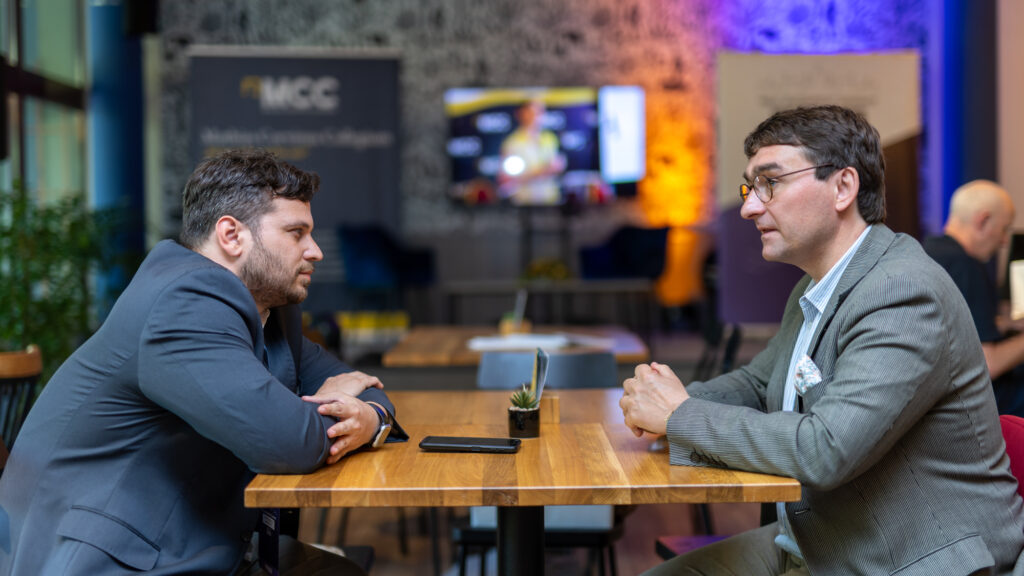Dr. Mikołaj Sławkowski Rode is a principal researcher in philosophy at the humanities Research Institute of the University of Buckingham, and director of graduate research in philosophy of the University of Buckingham in the United Kingdom. He spoke in a panel of the Budapest summit of Mathias Corvinus Colongium on technology and society last week, where he was graceful enough to sit with Hungarian conservative For an exclusive interview on how new technologies have affected teaching and learning.
***
I just listened to you on a panel on growth in the digital age, and I remember that the first words of your mouth when you took the microphone were: “the forehead collapsed”, and, I believe: “War was lost”. I still don’t know what you meant by that. Can you develop this please? What are you talking about precisely?
Yes. So, I think there are certainly harmful consequences of the proliferation of online technologies in communication, in the way our work is organized, and essentially concerning all areas of our life. And many people are very negative about these consequences and suggest ways to back down the clock, so to speak. But I think it’s impossible. This is what I meant.
I think that if you see it as a front line to fight, the front collapsed and there is nothing more to do, except by accepting the defeat and trying to face the consequences and the landscape that we have now. I think this technology is there to stay and the way it changes our lives will be permanent. So I think it is a little naive to think that we can somehow come back to what happened and come back to life forms and ways of communicating and the ways of working that we remember from the 20th century.
I grew up in a homeless house until I was in fifth year. Is my experience of life radically different from someone who now has a screen in front of them since birth?
Yeah, I’m sure, of course, in many ways. But again, the life of someone who grew up without a television in his house is different from someone who grew up with a television in his house. This change came roughly in the middle of the 20th century. And then earlier, in the interwar period, the big change grew with or without radio in your home. And then even before that, grow with a house that has a gramophone that can play discs and without gramophone that can play records. So I think that these are definitely changes, but I also think that the particular change that each of these inventions brings and that its omnipresence in society brings in itself less an impact or has less consequences in terms of intergenerational experience of growth and fundamental training that we undergo as a child and adolescents, then young adults.
The main thing is the speed with which changes occur now. I mean, it is nothing original at all, but I think there was a lot, much more continuity between the generations before the great technological advances of the first half of the 19th and then of the 20th centuries, which essentially created a landscape in which each generation has a very different world in which they grow. And so I think that it is not the inventions themselves that create the problem, but rather the extremely rapid rhythm of the progress of technology that creates all these social tensions and all these generational differences.
The idea of ”digital nativism” was mentioned several times during the conference. And most labeled it as an error, they disagreed as a concept. For example, Glenn Fahey, of Australia, told the public in the morning panel that humans have learned have not changed during this brief period since these new technologies were introduced. Thus, the fundamental way of learning has not changed, even if technology has changed. Do you agree with him?
At some levels, of course, learning is always the same process. However, the way the process takes place has changed. For example, many students who follow my courses use online versions of books rather than paper copies. And the way it changes the way they learn is really dramatic. So, when I studied, you would need to read large sections of the book you are studying or the book that discusses the subject on which you are currently working. But now nobody does that. I mean, of course, it has never been the case only if you write a test to note and discuss in a week, you would read all the sources back to back. You will find the most relevant places and, in most cases, even the tutors would give you the relevant page numbers. But it was even more narrowed by working with digital copies because now when you look at what the author or text in particular says on subject X or Y, you just have the search for search words x or y.
I would consider this to be progress.
In a way, of course, it saves time. But that also prevents you from learning the subject you are studying. You cannot escape learning requiring time. Students only cross places or sometimes only the sentences in which this subject appears. I saw students do this again and again where, when they quickly write an essay, they cite a sentence in which the keyword appears without context, and because of this, they completely interpret what the author tries to transmit. Now it’s because students are now approaching this tool as a solution to the problem. The test is a problem to be resolved and not the subject of the test to be resolved.
And online tools, or digital tools, help students see this in this way or strengthen the idea you can think of a test in this way. Of course, AI means that people look even more in this direction: see the essay as a task to be resolved rather than on the subject it approaches. So, I think that is, of course, something that tutors should be aware and it is partly their work to ensure that stress is on the subject. But at the same time, just this little thing to work with hard copies meant that you had to read at least the immediate context of all the statements on your subject. And that meant that you could already work on the subject of the test at a more advanced level, rather than starting with the bases itself: as it is obviously not what the author means; And out of context, this sentence does not tell you, in fact, or what is the position, but gives you a very biased idea of what the essay is.
Here in Hungary, there is a new regulation which dictates that even high school students have their phones and their mobile devices taken by the school at the start of the school day and that they are not delivered before the end, which caused some controversy. Do you agree with these regulations?
Yeah, absolutely. I think I’m a big fan of these regulations. I think it should be omnipresent, really. One thing that smartphones and computers in class do is that students constantly check what’s going on in the classroom. Some people are quite enthusiastic about it. They consider the classroom as a place of collaboration between the teacher and the students. Therefore, they believe that the fact that students are able to quickly search for what is happening is an advantage rather than an inconvenience. But I think it changes the dynamics of the classroom in a very undesirable way in that students have access to all the information in the world and that the teacher is noted by the board of directors on this subject without looking at the screen all the time. And I think it’s bad for two reasons.


The first reason is that I think in fact, it makes it more difficult for teachers to teach and for students to learn. The fact that you have been able to seek something that your teacher does not know can give you the impression that you now know the subject, perhaps better than the teacher, but in reality, of course, you do not do it and that you will very quickly forget what you have sought without knowing the context in which this information is relevant. And secondly – I think it is an even more important question – the fact that the teacher does not know something, even in his own region, for example, if a history teacher confuses a date on which they give students, is not as important as a sense of authority that teachers should have in class. I think that some way, this is of course provocative, but in a way, I think that the information or knowledge they can transmit is at least as important as, if not more, a feeling of authority that they are able to bring because this authority is something that facilitates learning.
We learn from the authorities. We cannot check everything ourselves and that when we check facts online, we only recovering authorities sometimes less than the one we learn. Thus, the illusion of the verification of facts and saper the authority by evidence created by these resources is, I think, really detrimental to the learning process really, which still depends on authority. This does not mean that this authority must be followed blindly. Of course, an authority can prevail over another where we can realize that someone we have taken as a authority before is no longer an authority or is a lesser authority on a given subject than someone else. But we cannot see someone else as a greater authority than our high school teacher unless we saw our high school teacher as a first place. In a world without any authority, I fear that learning will deteriorate. And he already visibly visibly has.
Related items:


